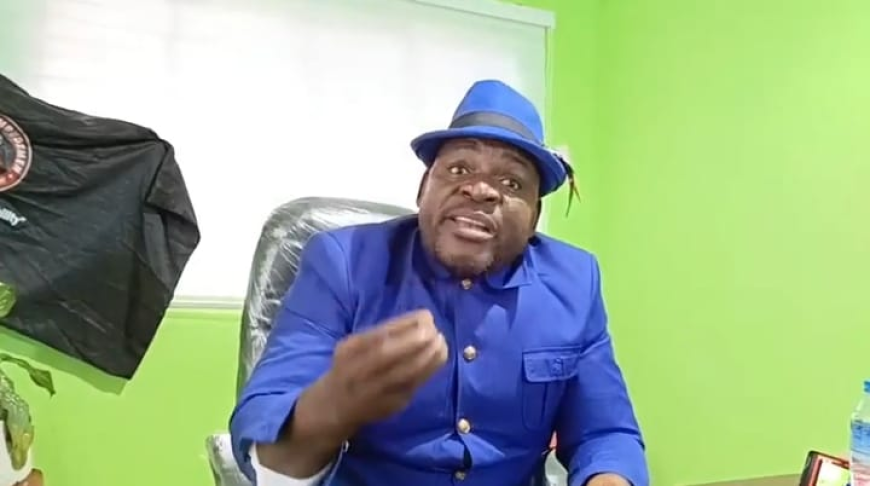A Former Warlord Turned Evangelist is Calling for a National Dialogue to Help Reconcile Liberia's Violent Past

MONROVIA, LIBERIA: Former feared warlord notoriously known as “General Butt-naked” during the civil war era, turned Evangelist Joshua Milton Blayhi, has underscored the need for a national dialogue between perpetrators and victims of Liberia’s bloody civil war as a pathway to genuine reconciliation.
The once notorious rebel general beseeches the Government of Liberia and senior elder councils to lead a charge of setting a stage where alleged perpetrators who were involved with the bloody civil war that claimed the lives of more than 250,000 citizens can practically dialogue and inspire national reconciliation.
Evangelist Blahyi asserted that focusing solely on prosecuting alleged perpetrators of war crimes may not entirely heal and reconcile the burning pains of victims and families of the brutal civil war.
The Liberian bloody civil unrest, which spanned from 1989 to 2003, erupted due to political oppression, ethnic tensions, and economic grievances under the regime of the People’s Redemption Council regime led by deceased former President Samuel Kanyon Doe.
The civil unrest recorded Evangelist Blayhi alias General Butt-naked as one of the fiercest rebel generals for the United Liberation Movement of Liberia for Democracy (ULIMO).
ULIMO was a pro-government militia that participated in the First Liberian Civil War (1989–1996)was established in May 1991 by Krahn and Mandingo refugees and soldiers who were personnel in the Armed Forces of Liberia.
Led by Alhaji Kromah and Raleigh Seekie, a Deputy Minister of Finance in Doe’s government, ULIMO entered Western Liberia in September 1991 after fighting alongside the Sierra Leonean army against the Revolutionary United Front (RUF).
ULIMO quickly scored significant gains in areas held by Charles Taylor’s National Patriotic Front of Liberia (NPFL), notably around the diamond mining areas of Lofa and Bomi counties.
From its beginning, ULIMO was beset with internal divisions, and the group effectively broke into two separate militias in 1994: ULIMO-J, an ethnic Krahn faction led by General Roosevelt Johnson, and ULIMO-K, a Mandingo-based faction led by Alhaji G. V. Kromah.
With approximately 8,000 combatants, the poor management of ULIMO-J led to leadership struggles and general discontent among its fighters.
In contrast, ULIMO-K was relatively united under Kromah, with approximately 12,000 combatants.
It is reported that the rebel group, both before and after its breakup, committed serious violations of human rights and war crimes.
But Evangelist Blayhi believes instead of prosecution, initiating a practical dialogue nationwide, for alleged perpetrators to seek forgiveness from victims' families, will bring more relief to the pain from the dark days.
"If I went to the War Crimes Court, my children would be free from the crimes I may have committed. I will want you people to know, if we want to stop this War Crimes Court, it is easy, it is a serious game, but it is easy. Let the elders come together, and give us the platform to say sorry, and let the alleged perpetrators go across and dialogue," Blahyi noted.
"Let it be a practical appeal for forgiveness, when you can appease the blood of those people dead through their relatives. Let the platform be given to recognize and honor victims. Once these practical dialogues are done, people who lost their loved ones will feel relieved, and it is one of the best ways to reconcile the past", he added.
Evangelist Blahyi revealed that some ex-combatants were constrained to get involved in self-defense and the protection of their families due to the news of the establishment of the War and Economic Crimes Court.
According to him, establishing a war crimes Court to hold individuals who played key roles in the civil war accountable is necessary, but initiating practical steps for dialogue is paramount in fostering genuine reconciliation.
The issue of prosecuting alleged war perpetrators in Liberia since the post-war era has emerged as a major call from citizens and civil society organizations to past and present governments, with a recommendation of establishing the War and Economic Crimes Court to ensure accountability.
Born in Monrovia into a Krahn family, Blahyi claims that at the age of seven, he was inducted as a priest into a secret society and participated in child sacrifices, along with assisting the regime of President Samuel Doe.
However, family members have disputed these claims, instead claiming Blahyi dropped out of school after the third grade and worked at a local market in Monrovia before turning to crime.
In 1993, Blahyi joined ULIMO and fought against the NPFL. He practically raised his militia of mostly child fighters known as the "Naked Base Commandos", and became known for going into combat without clothing, which led to “General Butt-naked”
In 1994, ULIMO split into the rival ULIMO-K and ULIMO-J, and Blahyi backed the latter faction, resisting an attempt by the NPFL and ULIMO-K to arrest its leader, Roosevelt Johnson, in April 1996.
Then in 1996, Blahyi claimed to have experienced a vision of Jesus and abandoned his unit, deserting ULIMO and turning to street preaching.
Upon the election of Charles Taylor in the 1997 elections, Blahyi fled to the Buduburam refugee camp in Ghana in 1999 to escape persecution by Taylor's administration.
There, Blahyi learned to read and write and began delivering sermons, founding a ministry and rehabilitation program. He returned to Liberia in January 2008 to testify before the Truth and Reconciliation Commission, becoming the first former Liberian warlord to do so.
His testimony sparked mixed reactions among the Liberian public but resulted in Blahyi achieving global fame, being featured in several documentaries, and inspiring a character in the 2011 musical comedy "The Book of Mormon."
What's Your Reaction?









































































